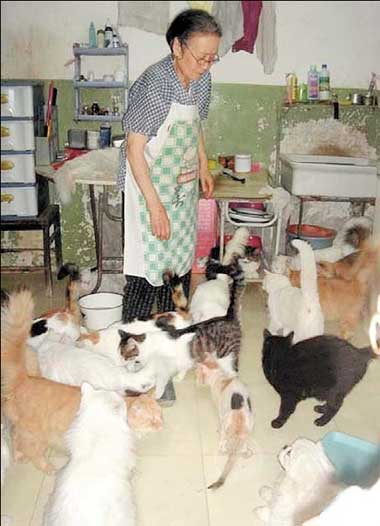Grandmother Ding Shiying has more than 200 "kids" - dogs and cats hanging around in her 160-square-meter courtyard house in central Beijing.
Dogs jump happily on visitors, wagging their tails.
 |
|
Ding Shiying, 81, feeds the cats at home in Beijing. [Shanghai Daily] |
"Don't be afraid. They are just welcoming you," she explains with a laugh, leading the way into her bedroom, the only place for guests to sit.
A white cat lies on her bed, eying strangers indifferently; a yellowish cat naps on her table; a black and white feline relaxes on the floor.
Ding, 81, looks vigorous as she moves about in a white shirt with a blue flower pattern and black cotton trousers.
"I'm in great health. They keep me active every day," she says, pointing to the roomful of animals.
She started to take in abandoned dogs and cats in 1973 when she worked as a doctor at the campus hospital of Beijing Normal University.
"It was only two and three at first but now there are around 200," she says.
A dog lying at her feet wakes up and yawns.
"This sweetie was dumped three years ago. I took her in from the street, but soon she was paralyzed with a spinal problem. Doctors told me to put her down, but I treated her and now she's as healthy as the others," she says.
Ding recalls all their stories: the poodle buried alive at a month old; the skinny black cat that's going blind dumped a few days before; the white puppy infected with flies and maggots and found on the street ...
Some don't survive.
"Once I got a blind dog with cuts all over its body. I tried my best to save it, but failed," Ding says.
After many years taking in abandoned dogs and cats, Ding has some understanding of human failings toward animals - a man wanted to give her his cat because his wife was pregnant and parents called because their children got tired of puppies.
"Like kids, pets are lives as well. Why should people take care of one at the expense of the other?" Ding asks angrily.
She keeps a newspaper clipping about an 18-year-old student who was fined US$5,000 and jailed for six months in the United States after being convicted of killing 19 cats.
"We need laws to punish people for abusing and abandoning animals," Ding says.
She shares the view of Sun Jiang, an expert in animal welfare law at the Northwest University of Politics and Law in Xi'an, capital of northwestern China's Shaanxi Province.
"China has no basic law to regulate the principles and application of animal protection. This makes it hard to draft specialized laws," says Sun.
Under existing laws, mainly rare, endangered and valuable species of wild animals are under protection. No legislation is in place to protect companion, working and entertainment animals.
"Abusing and killing pet dogs will lead to no punishment," Sun says. He believes this is why reports of animal abuse repeatedly make headlines.
In May, the city government of Hanzhong, Shaanxi Province, ordered that all dogs in rabies-infected villages be killed. At least 34,000 dogs have been killed, regardless of their state of health.
At a seminar at the Northwest University of Politics and Law in December 2008, experts began to draft an animal protection law to submit to lawmakers. Sun was in charge of the section on companion animals, or pets.
The draft, jointly written by eight law experts, is set to be finished this year. It will be published and submitted to the National People's Congress and government departments, such as the Ministry of Agriculture and the State Forestry Administration.
"Besides legislation, the public should be an important force. Animal welfare organizations in Western countries are better established. They even provide lawyers for animals in lawsuits," Sun says. But most Chinese counterparts provide limited help. "Most of them are small groups supported by individuals. They can only help a small number of animals and always run short of funds," he says. "They could more effectively operate in the form of foundations."
Ding has a very hard time running her animal asylum. After retiring in 1987, she spent all her monthly pension, 105 yuan (US$15.44), on 20 dogs and cats.
"It was far from enough, so I went to a nearby market every morning to pick up discarded food and fish intestines," she says.
She also covered veterinary expenses herself. Since she was a doctor, she handled vaccinations and treatments, but sterilization required surgery.
"Gradually more people heard about me and sent money, food and medicine." Today, she makes ends meet, but can take in no more animals.
Sun worries about what will become of the animals when Ding dies.
"She is old," he says. "It will be better to have an organization to take care of these animals."
But Ding has no trust in organizations. She once worked at a non-governmental animal rescue center, where the animals were kept in cages.
"It was wrong. You have to give them space or they'll fall ill and die. I let all my healthy babies roam free," she says.
She cages only sick pups and kittens for special care.
With no laws and regulations, animal protection groups have no standards on how to operate.
Sun suggests these organizations should be properly supervised by donors or government departments once laws are in place.
"I hope, when grandma Ding can no longer look after her animals, they can find another sanctuary," he says.
(Shanghai Daily July 29, 2009)